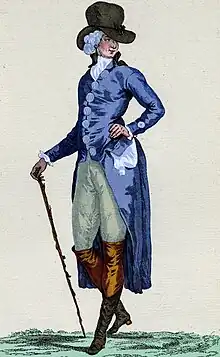To put on airs, also give airs, put in airs, give yourself airs, is an English language idiom and a colloquial phrase meant to describe a person who acts superior, or one who behaves as if they are more important than others.[1][2][3]
Origin
It is derived from the French word "air", meaning appearance, and was first used in the 1500s.[4] Variations of the phrase were used throughout the 1700s.[5] The phrase appears in the 1911 Dictionary of French and English by John Bellows. It appears under the entry for the French word poseur meaning to pose,[6] and more specifically "poseur: a person who pretends to be what he or she is not: an affected or insincere person".[7]
History
The phrase is derived from the French word "air" which meant appearance or look. The phrase has been in use since the 1500s.[4] To "Give Airs" was also referred to as a fake way of acting.[8] "Put on" is in modern emphatic use means: "to assume deceptively or falsely; to feign, affect or pretend."[9]
The phrase appears in the records of the 1661 Witchcraft trial of Florence Newton. It was said that a woman named Mary Longdon, "...believed her position gave her the right to airs and graces".[10]
It is considered an English Language idiom.[1] The phrase was used in a published book from the 1700s, Put in Airs.[8] The term was used in a book from 1759 by George Farquhar The Constant Couple "...when she puts on her airs, as you call it."[5] The phrase appears also in 1776 in a book by Francis Beaumont called Humorous Lieutenant: "You can give yourself Airs sometimes..."[11]
Amidst the United States Civil War, in 1864, a minstrel song (a genre now considered to be racially offensive) with a chorus and eight verses was published. It includes these lyrics: "Oh! white folks listen, will you now, this darkey's going to sing -.," and including two verses about personal vanity, followed by five on various Union Army's victories over the Confederacy, concluding: "Now where's this boasted chivalry, who sport the Stars and Bars? / Why they're learning from our Yankee boys the way to put on airs."[12][13]
It has been variously defined as for example, in an 1869 textbook says: "Put on a counterfeit appearance"[14] An 1882 dictionary says: "To put on airs, to assume airs of importance."[15] Another more modern usage: "put on airs and graces to behave affectedly."[16] Typified by false claims of mastery, superiority or pretense.[17][18]
Putting on airs is an example of divergence behavior, that can be, acting in a contrary way to dissociate oneself from their peers. It is similar to acting boorishly at a wedding reception.[19]
In popular culture
In the SpongeBob SquarePants episode Tea at the Treedome, Patrick Star refers to SpongeBob's description of Sandy Cheeks's air helmet as "fancy talk" for "puts on airs".[20]
See also
References
- 1 2 Ammer, Christine (2013) [2008]. The American Heritage Dictionary of Idioms (Paperback) (2nd ed.). Boston & New York: Houghton Mifflin Harcourt, Paw Prints. p. 174. ISBN 978-0-547-67658-6. 1439527245. Retrieved 4 October 2021.
- ↑ "put on airs". Dictionary Cambridge. Cambridge University Press. Retrieved 3 October 2021.
- ↑ "put on airs". The Free Dictionary. Farlex, Inc. Retrieved 3 October 2021.
- 1 2 "Putting on airs". The Book of Threes. 14 July 2017. Retrieved 3 October 2021.
- 1 2 Farquhar, George (1759). The Constant Couple. Edinburgh: The Exchange. p. 41. Retrieved 4 October 2021.
- ↑ Bellows, William (1911). Dictionary of French and English. New York: Henry Holt and Company. p. 466. Retrieved 4 October 2021.
- ↑ "Poseur". Merriam Webster Dictionary.
- 1 2 "Give Airs". The Idioms. Retrieved 3 October 2021.
- ↑ Put on. Vol. 2. Oxford University Press. 1971. p. 1651. Library of Congress 76-188038.
{{cite book}}:|work=ignored (help) - ↑ Locke, Tony (October 5, 2015). Irish Ghost Tales. History Press. p. 33. ISBN 9780750966658. Retrieved 4 October 2021.
- ↑ Beaumont, Francis; Fletcher, John (1776). Humorous Lieutenant. London: J. Tonson. p. 10. Retrieved 4 October 2021.
- ↑ "How to Put on Airs (Minstrel Song)". United States: n.p. 1864. OCLC 476542085.
- ↑ "Folks that Put on Airs". Good Old-times. Wehman Bros. 1914. p. 17.
- ↑ Ross, G.H. (1869). Text-book in the English Language for December 1869: Containing Addison's Spectator, Scott's Lay of the Last Minstrel, Byron's Prisoner of Chillon, and Full Notes Throughout. India: Sold for the Proprietor of the Madras Journal of Education, Madras Advertising and Printing Company. p. 63.
- ↑ Ogilvie, John; Annandale, Charles (1882). The Imperial Dictionary of the English Language: A Complete Encyclopedic Lexcon, Literary, Scientific and Technological. United Kingdom: Blackie & Son. p. 579.
- ↑ Feinstein, Jessica; Manser, Martin (2001). Heinemann English Dictionary. United Kingdom: Pearson Education. p. 19. ISBN 9780435104245.
- ↑ "Put on airs". vocabulary.com. Retrieved October 7, 2021.
put on airs: When you put on airs, you act like you're the master of something. If you wear a top hat and insist that everyone call you "sir" or "madam" while you boss them around, then you put on airs.
- ↑ To put on airs The Free Dictionary by Farlex
- ↑ Wardhaugh, Ronald (2010). An Introduction to Sociolinguistics (Paperback). United Kingdom: Wiley. p. 113. ISBN 9781405186681.
- ↑ "SpongeBob SquarePants" Help Wanted/Reef Blower/Tea at the Treedome (TV Episode 1999) - Quotes - IMDb
